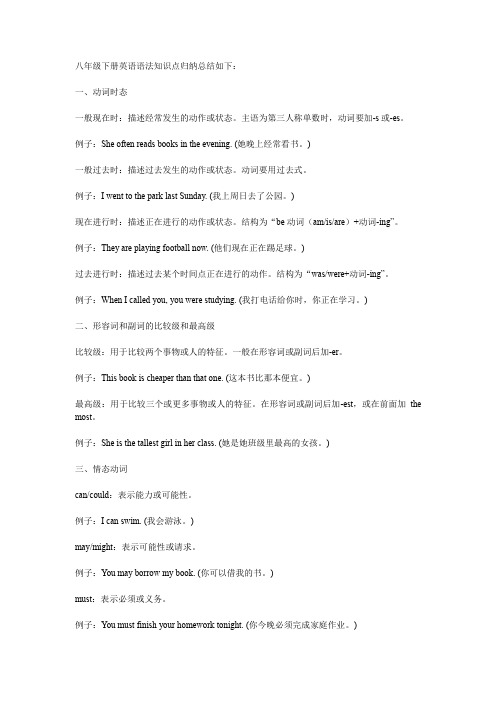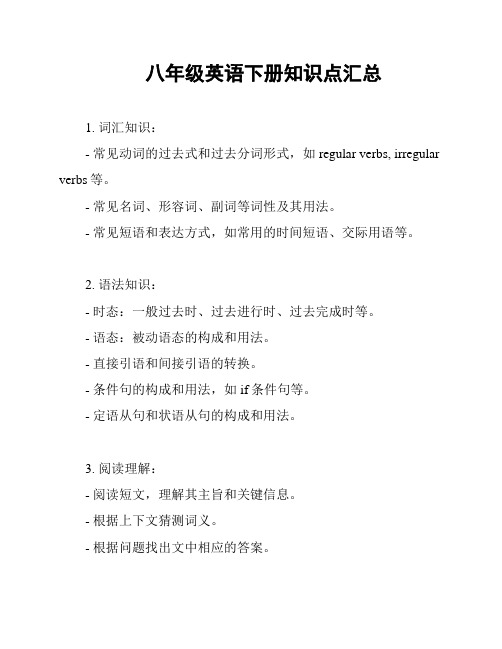初二年级下册英语知识点整理
八年级下册英语语法知识点归纳总结

八年级下册英语语法知识点归纳总结如下:一、动词时态一般现在时:描述经常发生的动作或状态。
主语为第三人称单数时,动词要加-s或-es。
例子:She often reads books in the evening. (她晚上经常看书。
)一般过去时:描述过去发生的动作或状态。
动词要用过去式。
例子:I went to the park last Sunday. (我上周日去了公园。
)现在进行时:描述正在进行的动作或状态。
结构为“be动词(am/is/are)+动词-ing”。
例子:They are playing football now. (他们现在正在踢足球。
)过去进行时:描述过去某个时间点正在进行的动作。
结构为“was/were+动词-ing”。
例子:When I called you, you were studying. (我打电话给你时,你正在学习。
)二、形容词和副词的比较级和最高级比较级:用于比较两个事物或人的特征。
一般在形容词或副词后加-er。
例子:This book is cheaper than that one. (这本书比那本便宜。
)最高级:用于比较三个或更多事物或人的特征。
在形容词或副词后加-est,或在前面加the most。
例子:She is the tallest girl in her class. (她是她班级里最高的女孩。
)三、情态动词can/could:表示能力或可能性。
例子:I can swim. (我会游泳。
)may/might:表示可能性或请求。
例子:You may borrow my book. (你可以借我的书。
)must:表示必须或义务。
例子:You must finish your homework tonight. (你今晚必须完成家庭作业。
)四、被动语态被动语态用于描述事物的状态或描述被动发生的动作。
结构为“be动词(am/is/are/was/were)+动词的过去分词”。
八年级下册英语全书语法知识点汇总

八年级下册英语全书语法知识点汇总Unit 1 What’s the matter?一、重点词组1. have a fever / cough / cold 发烧/咳嗽/受凉;感冒2. have a toothache / stomachache 牙疼/胃疼3. have a sore back / throat 背疼/喉咙痛4. talk too much 说得太多5. drink enough water 喝足够的水6. take risks (take a risk) 冒险7. in a difficult situation 在困境中8. give up 放弃9. make a decision 做出决定10. lie down and rest 躺下来休息11. hot tea with honey 加蜂蜜的热茶12. see a dentist 看牙医13. get an X-ray 拍X 光片14. take one’s temperature 量体温15. put some medicine on sth. 在……上面敷药16. feel very hot 感到很热17. sound like 听起来像18. all weekend 整个周末19. in the same way 以同样的方式20. go to a doctor 看医生21. go along 沿着……走22. on the side of the road 在马路边23. shout for help 大声呼救24. without thinking twice 没有多想25. get off 下车26. have a heart problem 有心脏病27. to one’s surprise 使……惊讶的;出乎……意料28. thanks to 多亏了;由于29. in time 及时30. save a life 挽救生命31. get into trouble 造成麻烦(或烦恼)32. right away 立刻;马上33. because of 由于34. get out of 离开;从……出来35. hurt oneself 受伤36. put a bandage on sth. 用绷带包扎37. fall down 摔倒38. feel sick 感到恶心39. have a nosebleed 流鼻血40. cut his knee 割伤他的膝盖41. put her head back 把她的头向后仰42. have problems breathing 呼吸困难43. mountain climbing 登山运动44. be used to doing sth. 习惯做某事45. run out (of) 用完;耗尽46. so that 以便47. so …that 如此……以至于……48. be in control of 掌管;管理49. keep on doing sth. 继续或坚持做某事二、重点句型1. What’s the matter? 怎么了?What’s the matter with you?= What’s the trouble with you?= What’s wrong with you? 你怎么了?2. What should she do? 她该怎么办呢?Should I take my temperature? 我该量一下体温吗?主语+ should/shouldn’t + 动词原形①You should lie down and rest. 你应该躺下休息一会儿。
八年级英语下册知识点汇总

八年级英语下册知识点汇总
1. 词汇知识:
- 常见动词的过去式和过去分词形式,如regular verbs, irregular verbs等。
- 常见名词、形容词、副词等词性及其用法。
- 常见短语和表达方式,如常用的时间短语、交际用语等。
2. 语法知识:
- 时态:一般过去时、过去进行时、过去完成时等。
- 语态:被动语态的构成和用法。
- 直接引语和间接引语的转换。
- 条件句的构成和用法,如if条件句等。
- 定语从句和状语从句的构成和用法。
3. 阅读理解:
- 阅读短文,理解其主旨和关键信息。
- 根据上下文猜测词义。
- 根据问题找出文中相应的答案。
4. 写作技巧:
- 书面表达:写信、写作文等。
- 口头表达:进行简短的演讲、对话等。
- 语法和拼写的正确应用。
5. 听力技巧:
- 听取关键信息,如对话中的时间、地点、人物等。
- 根据对话内容回答问题。
- 培养对不同语速和语调的听力理解能力。
以上是八年级英语下册的主要知识点汇总,希望对你的学习有所帮助!。
八年级下英语知识点归纳

一、词汇:1.名词:可数名词和不可数名词的用法,如单数、复数形式、所有格等。
2.代词:人称代词、物主代词、反身代词、指示代词、不定代词等的用法。
3. 动词:be动词、实义动词、情态动词的用法,以及时态、语态等的变化。
4.介词:表示时间、地点、方向、方式等的常见介词的使用。
5.数词:基数词、序数词、分数等的用法。
6.冠词:定冠词和不定冠词的用法。
7.形容词和副词:形容词和副词的比较级和最高级的变化,以及修饰位置的特殊情况。
8.前缀和后缀:常见的前缀和后缀的构词法。
二、语法:1.句子的基本结构:主谓结构、主谓宾结构、主语从句、宾语从句等。
2.时态:一般现在时、一般过去时、一般将来时、现在进行时等时态的用法。
3.被动语态:被动语态的构成和用法。
4.祈使句:祈使句的用法,以及一些常用的祈使句句型。
5.条件句:零条件句、一般条件句、虚拟条件句等条件句的用法。
6.定语从句和状语从句:定语从句和状语从句的引导词和连接词的用法。
三、阅读理解:1.判断事实和推理:阅读短文,根据所读内容判断事实的真伪,以及进行简单的推理。
2.理解细节:从短文中找出相关细节,回答问题或完成任务。
3.推断意义:通过猜测词义、上下文推断等,理解隐含在短文中的意义。
4.主旨归纳:根据短文的内容,概括出短文的主旨或中心思想。
5.信息归纳:将短文中的信息按照一定的组织方式进行归纳。
以上是八年级下英语知识点的大致归纳,涵盖了词汇、语法和阅读理解等方面。
当然,具体的知识点还需要结合具体教材和学校的教学要求来确定。
希望以上内容对您有所帮助。
初二下册英语知识点归纳

初二下册英语知识点归纳1. 时态:- 一般现在时:表示经常性的动作、习惯、真理等。
- 现在进行时:表示正在进行的动作。
- 一般过去时:表示过去的某个时间发生的动作或存在的状态。
- 过去进行时:表示过去某个时间正在进行的动作。
- 将来时:表示将要发生的动作。
2. 名词:- 可数名词:可以单独表示一个或多个的名词。
- 不可数名词:不能用于复数形式的名词,只能作为整体来看待。
- 所有格:表示所属关系的名词形式,一般在名词后面加's。
3. 形容词:- 基本形容词:用于修饰名词。
- 比较级形容词:用于表示两者之间的比较。
- 最高级形容词:用于表示三者或三者以上的比较。
4. 副词:- 修饰动词、形容词或其他副词,用于表示程度、方式、时间等。
5. 代词:- 主格代词:作主语的代词形式。
- 宾格代词:作动词或介词的宾语的代词形式。
- 形容词性物主代词:表示所属关系的代词形式。
- 名词性物主代词:作为名词的代替。
6. 数词:- 基数词:表示数量的词。
- 序数词:表示顺序的词。
7. 冠词:- 定冠词:表示特指的冠词形式,即“the”。
- 不定冠词:表示泛指的冠词形式,即“a/an”。
8. 动词:- 及物动词:需要带宾语才能完成意义的动词。
- 不及物动词:不需要带宾语就能完成意义的动词。
- 动词不定式:由“to”加动词原形构成的短语。
9. 介词:- 用于连接名词、代词或动词与其他词语的词。
10. 连词:- 表示并列关系的连词,如“and, but, or”等。
- 表示选择关系的连词,如“either…or, neither…nor”等。
- 表示因果关系的连词,如“because, so, therefore”等。
11. 疑问句:- 一般疑问句:以助动词、情态动词或be动词开头的陈述句,问句式为“助动词/情态动词/be动词+主语+谓语?”- 特殊疑问句:用特殊疑问词引导的疑问句,如“what, when, where, who, which, why, how”等。
八年级下册英语一到三单元知识点

八年级下册英语一到三单元知识点那咱开始!一单元知识点。
1. 一般将来时。
- 这可是个重要的时态哦!表示将来要发生的动作或存在的状态。
常见的结构有“will + 动词原形”和“be going to + 动词原形”。
比如说,“I will go to Beijing next week.”(我下周要去北京。
)“He is going to have a party tomorrow.”(他明天要开个派对。
)- 要注意哦,will 比较随意,be going to 通常是有计划、有打算的。
2. 短语大集合。
- fall down (摔倒)想象一下,像个大冬瓜“扑通”一下倒地上。
- look for (寻找)别和 find 搞混啦,find 是“找到”,look for 是还在努力找的过程。
- in the future (在未来)未来嘛,充满了神秘和可能!二单元知识点。
1. 情态动词 could。
- could 这个小家伙,语气比 can 更委婉、更客气。
“Could you please help me?”(你能帮帮我吗?)比“Can you please help me?”听起来更有礼貌。
- 还有,could 还能是 can 的过去式,表示过去的能力。
2. 动词短语。
- cheer up (使高兴;使振奋)就像给心情打了一针兴奋剂!- give out (分发;散发)把东西一个一个发出去。
- come up with (想出;提出)脑袋里突然蹦出个好主意。
3. 感叹句。
- What + (a/an) + 形容词 + 名词 + (主语 + 谓语)!“What a beautiful flower!”(多美的花啊!)- How + 形容词/副词 + (主语 + 谓语)!像“How fast he runs!”(他跑得多快啊!)1. 过去进行时。
- 这是在讲过去某个时刻正在进行的动作。
结构是“was/were + 动词的现在分词”。
八年级下册英语知识点最全归纳

八年级下册英语知识点最全归纳Unit 1 短语及句型1.many\\much---- more + 可数或不可数名词更多few --- fewer + 可数名词更多little ----- less +不可数名词更少例如:more people、more pollution、less free time、less pollution、fewer cars、fewer trees2.there will be 将会有 There will be more people.将会有更多的人Will there be less pollution?会有更少的污染吗?Yes,there will.\\ No,there won’t.是,会有。
\\ 不,不会有。
3.be free 免费的4. on computers 在电脑上 on paper 在纸上5.live to be 活到 live to be 200 years old 活到200岁6.fall in love with sb.\\sth. 喜爱某人或某物7.live alone 单独居住8.on vacation 度假9.over and over again 一遍又一遍10.be the same as 与…一样be different from 与…不同unit 2 单词及短语1.What should I \\he\\she\\they\\you do? 我\\他\\她\\他们\\你该怎么办? You could write him a letter. 你可以给他写一封信。
2.argued with sb. 与某人争吵3.out of style 过时的 in style 时尚的4.a ticket to a ball game 一场球赛的票5.surprise sb. 使某人惊奇be surprised at sth. 对…感到惊奇to one’s surprise 令某人惊奇的事6.pay for 支付7.ask sb. for sth. 向某人要求某物ask sb. to do sth. 要求某人做某事8.have a bake sale 烧烤9.find out 发现,查明10.get on well with sb. 与某人相处得好11.have a fight with sb. 与某人争吵、打架12.not……until 直到…才13.it’s time for sth.\\it’s time to do sth. 做某事的时间到了14.under too much pressure 承受太多的压力15.take part in 参加,参与16.a mother of three 三个孩子的妈妈Unit 3 短语及句型1.What were you doing when the UFO arrived?当UFO到达时你在干什么?2.While the boy was walking down the street, the UFO landed. 当男孩在沿着街道走时,UFO降落了3.in front of 在…之前(外部整体前)in the front of (内部整体前)4.talk on the phone 在电话中交谈nd on the street 在街上降落6.walk down the street 沿着街道走7.take off (过去式 took off) 起飞8.around ten o’clock 大约10点9.You can imagine how strange it was!你可以想象它有多奇怪!10.Museum of Flight 飞行博物馆11.jump down 跳下来12.in a tree 在树上 on a tree 长在树上13.run away 跑开,逃跑14.say to sb. 对某人说15.one of the most important events 最重要的事件之一 (one of + 形容词最高级+名词复数)最…之一16.in silence 无声的17.take place 发生(预先安排) happen 发生 (偶然)18.have meaning to sb. 对…来说有意义Unit 4 短语及句型1.He said he was hard-working. 他说他努力学习了2.She said she was having a party for Lana她说她为Lana举行了聚会3.mad at sb. 对某人生气4.first of all 首先5.pass sth. to sb. \\ pass on sth. 传递某物6.be sppoused to 应该7.I’m better at reading than listening. 我的阅读比听力好。
八年级下册英语知识点

八年级下册英语知识点第一篇:八年级下册英语知识点初二(下)英语知识点总结I.重点短语1.on time 2.out of 3.all by oneself 4.lots of 5.no longer 6.get back 7.sooner or later 8.run away 9.eat up 10.take care of 11.turn off 12.turn on13.after a while 14.make faces15.teach oneself 16.fall off 17.play the piano 18.knock at 19.to one's surprise 20.look up 21.enjoy oneself 22.help yourself 23.tell a story / stories 24.leave....behind …… e along 26.hold a sports meeting 27.be neck and neck 28.as...as 29.not so / as...as 30.do one's best 31.take part in 32.a moment late 33.Bad luck!34.fall behind 35.high jump 36.long jump 37.relay race 38.well done!39.take off 40.as usual 41.a pair of 42.at once43.hurry offe to oneself 45.after a while 46.knock on 47.take care of 48.at the moment 49.set off50.here and there 51.on watch 52.look out53.take one’s placeII.重要句型1.We’d better not do sth.2.leave one.oneself3.find one’s way to a place4.stand on one’s head5.make sb.Happy6.catch up with sb.7.pass on sth.to somebody8.spend time doing sth.9.go on doing sth.10.get on well with sb.11.be angry with sb.12.be fed up with sth.13.not…until…14.make room for sb.III.交际用语1.We’re all by ourselves.2.I fell a little afraid.3.Don’t be afraid.4.Help!5.Can’t you hear anything?6.I can’t hear anything / anybody there.7.Maybe it’s a tiger.8.Let’s get it bac kbefore they eat the food.9.Did she learn all by herself? 10.Could she swim when she was …years old? 11.She didn’t hurt herself.12.He couldn’t buy himself many nice things.13.Did he enjoy himself? 14.Help yourselves.15.Bad luck!e on!17.Well done!Con gratulations(to…)!18.It must be very interesting.19.I don’t think you’ll like it.20.It seems to be an interesting book.21.I’m sure(that)… I’m not sure if… I’m not sure what to… 22.I hope so.23.What was he/she drawing when…?24.I’m sorry to trouble you.25.Would you please…? 26.What were you doing at ten o’clock yesterday morning? 27.You look tired today.28.You’d better go to bed early tonight, if you can.29.How kind!30.Let’s move the bag, or it may cause an accident.31.It’s really nice of you.32.Don’t mentio n it.33.Don’t crowd around him.IV.重要语法1.不定代词/副词的运用;2.反身代词的用法;3.并列句;4.形容词和副词的比较等级;5.冠词的用法;6.动词的过去进行时;【名师讲解】 1.bring/takeBring表示“带来、拿来”,指从别处朝说话人所在或将在的地方“带来、拿来”。
- 1、下载文档前请自行甄别文档内容的完整性,平台不提供额外的编辑、内容补充、找答案等附加服务。
- 2、"仅部分预览"的文档,不可在线预览部分如存在完整性等问题,可反馈申请退款(可完整预览的文档不适用该条件!)。
- 3、如文档侵犯您的权益,请联系客服反馈,我们会尽快为您处理(人工客服工作时间:9:00-18:30)。
初二年级下册英语知识点整理
初二年级下册英语知识点整理
Unit3WhatwereyoudoingwhentheUFOarrived?
知识点:
过去进行时
a)过去进行时由“was/were+动词ing形式”构成。
以动词work 为列,b)其肯定式,c)否定式,d)疑问式以及简略答语见下表:
肯定式:I/He/She/Itwasworking.We/You/Theywereworking.
否定式:
I/He/She/Itwasnotworking.We/You/Theywerenotworking.
疑问式和简略答语:WasIworking?Yes,youwere.
Washeworking?No,hewasn’t.
【注意】wasnot常简略为wasn’t;werenot常简略为weren’t
e)过去进行时的用法:过去进行时表示过去某一时刻或某一段时间正在进行的动作。
这一特定的过去时间,f)除有上,g)下文暗示以外,h)一般用时间状语来表示
not…until直到…才。
表示动作在某时之前尚未开始,直到此时动作才开始。
not…until可以用after或when来代替,但主句谓语动词要用肯定形式。
Until为连词时后接时间状语从句,until 作介词时,后面接表示时间的名词。
Until用于肯定句多表示动作或状态一直延续到until所表示的时间为止,意思为“直
到…”from..till…中till往往表示不太具体的时间。
From…to…或from…until常用来表示具体的'时间。
findit…todo,it在此句中为形式宾语代表动词不定式,动词
不定式为真正的宾语,常用于这种用法的动词有
find,feel,think,make等。
“疑问词+不定式“结构相当于一个名词性从句,常常可用同等
成分的从句代替。
改写时,只需在疑问词后面加一个适当的主语(这
个主语一般与主句的主语一致),并将不定式改成适当形式的谓语即可。
如,
Wheretogoisstillaquestion.=Whereweshouldgoisstillaquestion.
when与while:when连接的状语从句是个特殊句型,“前一个分
句(谓语动词用过去进行时)+when(作并列连词,意思为“这时,突然”)+后一个分句(谓语动词用一般过去时)”表示在前一个动作正
在进行的过程中突然发生了后一个动作,when强调动作的突然性,when后面的动词为非延续性动词;while表示“在….过程中”,强
调在一段时间内,所以while引导的从句中的谓语动词必须为延续
性动词。
在状语从句中,若从句放在句首时,应用逗号与主句隔开。
感叹句的构成:What+a/an+形容词+单数名词+主语+谓
语!Whatagoodbookitis!
What+形容词+复数可数名词+主语+谓
语!Whateasyquestionstheyare!
What+形容词+不可数名词+主语+谓语!Whatcoldweatheritis!
How+形容词+主语+be动词!Hownicethewatchis!
How+副词+主语+谓语!Howhardtheyareworking!
8.takeplace,happen“发生”:takeplace指“发生事先计划或
预想到的事物”;happen指“一切客观事情或情况的偶然或未能预
见地发生”。
两者都是不及物动词或短语,后面不能跟宾语,也不
能用于被动语态;happen的意义很广泛,而takeplace仅用于历史
上的事件,集会等,是先行布置而后发生或举行的事件,它不用于
地震等自然界的现象。
happentodo巧遇sthhappenstosb某人遭遇某事
9.不定代词all,both,each,every与not连用时,只表示部分否定,在否定句中用and连接两个宾语,表语,定语,状语时,只表
示部分否定,并且否定and后面的部分;如用or连接句中两个部分,则表示全部否定。
如,Sheisn’tabrightandbeautifulgirl.她并不
是一个既聪明又漂亮的女孩。
(部分否
定)Sheisn’tabrightorbeautifulgirl.她是一个既不聪明又不漂亮
的女孩。
(全部否定)。
